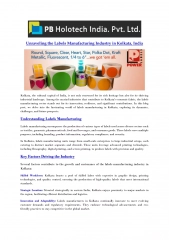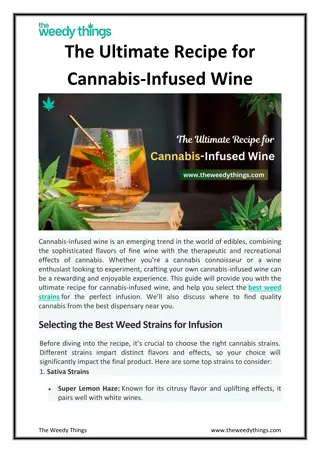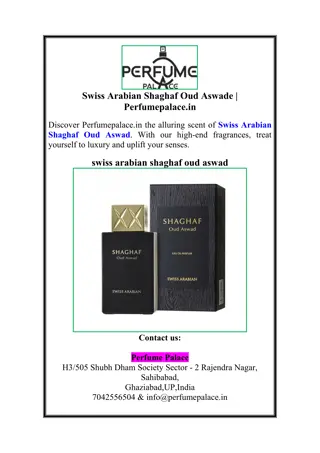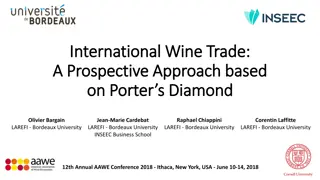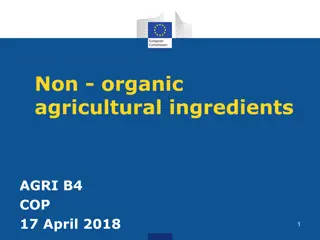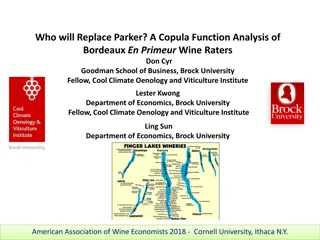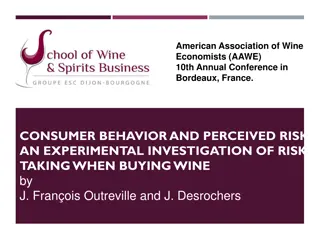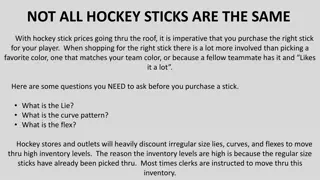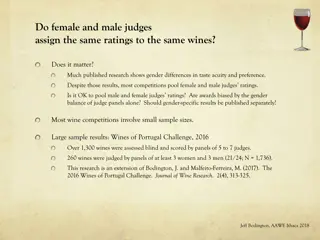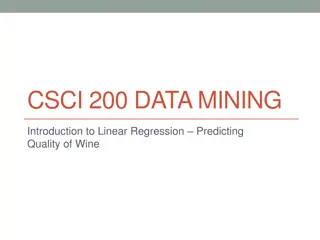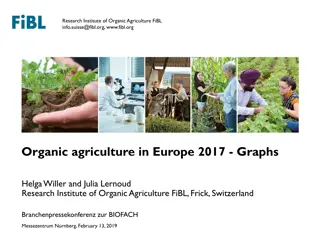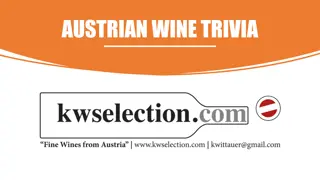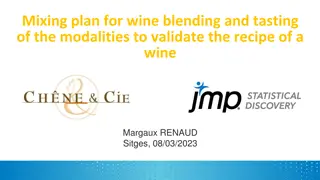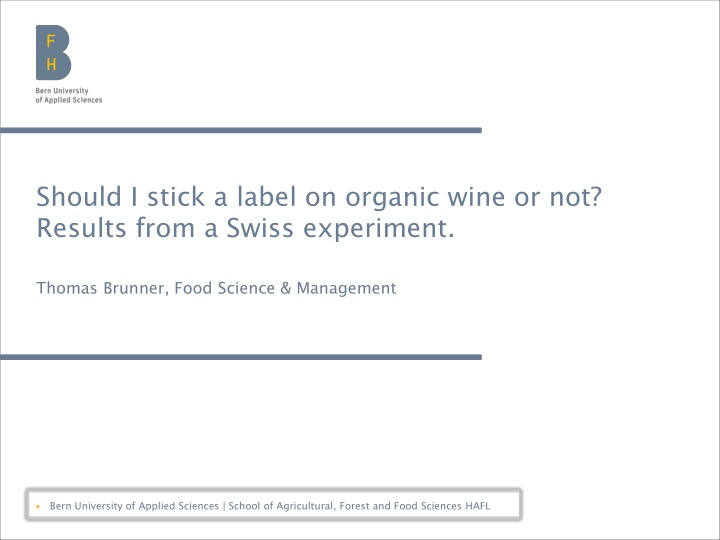
Influence of Labeling on Consumer Perception of Organic Wine: Swiss Experiment Results
Discover the impact of labeling on consumer perception in a Swiss study on organic wine and its correlation to taste, quality, and pricing. Explore how sensory transfer, sustainability, and virtue concepts affect consumer preferences and purchasing decisions.
Download Presentation

Please find below an Image/Link to download the presentation.
The content on the website is provided AS IS for your information and personal use only. It may not be sold, licensed, or shared on other websites without obtaining consent from the author. If you encounter any issues during the download, it is possible that the publisher has removed the file from their server.
You are allowed to download the files provided on this website for personal or commercial use, subject to the condition that they are used lawfully. All files are the property of their respective owners.
The content on the website is provided AS IS for your information and personal use only. It may not be sold, licensed, or shared on other websites without obtaining consent from the author.
E N D
Presentation Transcript
Should I stick a label on organic wine or not? Results from a Swiss experiment. Thomas Brunner, Food Science & Management Bern University of Applied Sciences | School of Agricultural, Forest and Food Sciences HAFL Bern University of Applied Sciences | School of Agricultural, Forest and Food Sciences HAFL
Sensation transfer Consumers are highly influenced in their hedonic evaluation of foods and beverages by the information provided (Skaczkowski et al., 2016) Packaging (e.g. Lapierre et al., 2011) Branding (e.g. Cavanagh et al., 2014) Labeling (e.g. Ebneter et al., 2013) Sensation transfer (Cheskin, 1954, 1957) Expectation of taste Extrinsic information Sensory perception Bern University of Applied Sciences | School of Agricultural, Forest and Food Sciences HAFL
Sensation transfer and organic Organic foods generally perceived to be healthier but less tasty, particularly for those who expressed less concern about the environment (Schuldt & Hannahan, 2013) Organic bread significantly more liked when it was labelled as such than when tasted blind (Annette et al., 2008) Those who were interested in issues of sustainability liked organic products more (Laureati et al., 2013) Depends on the product being evaluated and on the interest of the consumer in sustainability/health Bern University of Applied Sciences | School of Agricultural, Forest and Food Sciences HAFL
Virtue and vice (van Doorn & Verhoef, 2011) Primed participants with a vice versus virtue mindset Found that an organic claim had a negative impact on quality perceptions in the vice manipulation Quality perceptions had a positive impact on WTP In vice food categories, organic claims are associated with lower quality, which seems to be only partly compensated by higher prosocial benefits Bern University of Applied Sciences | School of Agricultural, Forest and Food Sciences HAFL
Sensation transfer and wine Parker points (72 vs. 92) influenced liking of the wine when given prior to the tasting (Siegrist & Cousin, 2009) Disclosing a high price before the tasting yieled higher ratings (only for women) whereas disclosing a low price did not influence the ratings (Almenberg & Dreber, 2009) Bern University of Applied Sciences | School of Agricultural, Forest and Food Sciences HAFL
Methods Blind tasting with 38 participants Age M = 37.87 years (SD = 11.15), 22 female Two comparable white and two comparable red wines Vieux Murets, Johannisberg du Valais, AOC 2013, CHF 9.45 Pasas Monastrell, Vi as Viejas, Jumilla, DO 2011, CHF 11.50 Told that one was conventionally the other organically produced, actually the same wine for each color Hedonic rating on a 10 cm line I don t like it at all and I like it very much Bern University of Applied Sciences | School of Agricultural, Forest and Food Sciences HAFL
Results Color: F(1,36) = 15.33, p < .001 Viticulture: F(1,36) = 6.41, p < .05 Interaction: F(1,36) < 1 Bern University of Applied Sciences | School of Agricultural, Forest and Food Sciences HAFL
Discussion Another example of how consumers are influenced by extrinsic information The organic label did not help to improve the perceived quality of wine Usually, people equate organic with more healthy and healthy with less tasty (Raghunathan et al., 2006). An organic label might work well with foods that are supposed to be healthy Wine is primarily a luxury beverage that is consumed to enjoy and socialize, and thus does not have to be, or perhaps should not be, healthy Participants prior experience with drinking organic wine did not change this pattern Bern University of Applied Sciences | School of Agricultural, Forest and Food Sciences HAFL
Contact Dr. Thomas Brunner Professor of Consumer Behavior Bern University of Applied Sciences Food Science & Management L nggasse 85 CH-3052 Zollikofen thomas.brunner@bfh.ch +41 (0)31 910 22 25 Bern University of Applied Sciences | School of Agricultural, Forest and Food Sciences HAFL t Hochschule f r Agrar-, Forst- und Lebensmittelwissenschaften HAFL

